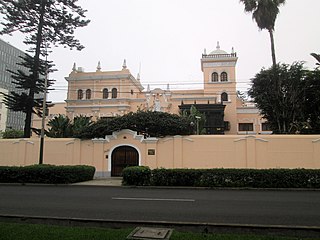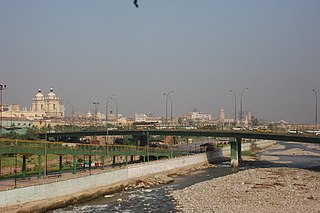
The Historic Centre of Lima is the historic city centre of the city of Lima, the capital of Peru. Located in the city's districts of Lima and Rímac, both in the Rímac Valley, it consists of two areas: the first is the Monumental Zone established by the Peruvian government in 1972, and the second one—contained within the first one—is the World Heritage Site established by UNESCO in 1988, whose buildings are marked with the organisation's black-and-white shield.

Metropolitano is a bus rapid transit system serving the city of Lima, Peru. Its construction began in the year 2006.

The 2020 Peruvian protests were a series of demonstrations sparked after the removal of President Martín Vizcarra that took place from 9 November to 17 November 2020.

Francisco Rafael Sagasti Hochhausler is a Peruvian engineer, academic, politician, and author who served as the President of Peru from November 2020 to July 2021.

Following the ousting of president of Peru, Pedro Castillo on 7 December 2022, a series of political protests against the government of president Dina Boluarte and the Congress of Peru occurred. The demonstrations lack centralized leadership and originated primarily among grassroots movements and social organizations on the left to far-left, as well as indigenous communities, who feel politically disenfranchised. Castillo was removed from office and arrested after announcing the illegal dissolution of Congress, the intervention of the state apparatus, and the forced establishment of an "emergency government", which was characterized as a self-coup attempt by all government institutions, all professional institutions, and mainstream media in Peru while Castillo's supporters said that Congress attempted to overthrow Castillo. Castillo's successor Dina Boluarte, along with Congress, were widely disapproved, with the two receiving the lowest approval ratings among public offices in the Americas. Among the main demands of the demonstrators are the dissolution of Congress, the resignation of Boluarte, new general elections, the release of Castillo, and the formation of a constituent assembly to draft a new constitution. It has also been reported that some of the protesters have declared an insurgency in Punos's region. Analysts, businesses, and voters said that immediate elections are necessary to prevent future unrest, although many establishment political parties have little public support.

The 2022–2023 Apurímac protests corresponds to a series of protests and violent confrontations that began on 10 December 2022 in the department of Apurímac in the context of the December 2022 Peruvian protests. The protesters demand the resignation of President Dina Boluarte, the closure of the Congress of the Republic, and new general elections. Unlike the protests in other regions and cities, in Apurímac the confrontations are more violent, and criminal acts have been recorded, such as the kidnapping of police officers and attacks on police stations. The Boluarte government declared a state of emergency, removing some constitutional protections from citizens, including the rights preventing troops from staying within private homes and buildings, freedom of movement, freedom of assembly and "personal freedom and security".

The Ayacucho massacre was a massacre perpetrated by the Peruvian Army on 15 December 2022 in Ayacucho, Peru during the 2022–2023 Peruvian protests, occurring one day after President Dina Boluarte, with the support of right-wing parties in Congress, granted the Peruvian Armed Forces expanded powers and the ability to respond to demonstrations. The clash occurred due to the protesters' attempt to storm the local airport. On that day, demonstrations took place in Ayacucho and the situation intensified when the military deployed helicopters to fire at protesters, who later tried to take over the city's airport, which was defended by the Peruvian Army and the National Police of Peru. Troops responded by firing live ammunition at protesters, resulting in ten dead and 61 injured. Among the injured, 90% had gunshot wounds, while those killed were shot in the head or torso. Nine of the ten killed had wounds consistent with the ammunition used in the IMI Galil service rifle used by the army.
This is a broad timeline of the 2022–2023 Peruvian protests against the government of Dina Boluarte and the Congress of Peru, sparked by the self-coup attempt of President Pedro Castillo, who was later arrested for his actions. The protests were organized by social organizations and indigenous peoples who felt they experienced political disenfranchisement, specifically on the politically left-wing to far left, with the groups demanding immediate general elections and a constituent assembly to draft a new Constitution of Peru.

The Javier Alzamora Valdez Building is located in the historic center of Lima, Peru. It stands at the intersection of Abancay and Colmena avenues, next to the University Park. Formerly the headquarters of the Ministry of Education, it's the main location of the Superior Court of Justice of Lima, part of the Judiciary of Peru.

The Embassy of the United States in Lima is the official diplomatic mission of the United States of America to the Republic of Peru. The chancery is located in the upper-scale district of Santiago de Surco since 1995.

Inca Garcilaso de la Vega Avenue, also known by its old name, Wilson Avenue, is an avenue in Lima, Peru.

Spain Avenue, formerly known as the Avenue of the Exhibition and then as Alfonso XIII Avenue until 1931, is an avenue in Lima, Peru. It extends from east to west in the districts of Lima and Breña along 7 blocks. The tracks of the Metropolitano extend along its route between Paseo de la República and Alfonso Ugarte Avenue.

The Casa Matusita is a building located at the intersection of Garcilaso de la Vega and España avenues in the center of Lima, Peru. It is known for the popular belief of being a place where paranormal activity exists.

The Embassy of the Russian Federation in Lima is the official diplomatic mission of Russia to the Republic of Peru. It served as the embassy of the Soviet Union from its inauguration until the country's dissolution in 1991.

Democracy Square is a public square in the Historic Centre of Lima, Peru. It is located on the former site of the Bank of the Nation Building, which burned down in the year 2000 during the Four Quarters March. The park's address is 1045 Nicolás de Piérola Avenue.

José Gregorio Castro Miranda, O.F.M., was a Roman Catholic prelate who was Bishop of Cuzco from 1910 to 1917. He mainly worked to integrate the local indigenous population to the church's teachings by translating prayers and church music to Quechua.

The Monumental Museum of the District Municipality of Huanta, also known simply as the Huaura Balcony, is a war museum located in the Peruvian city of Huaura, dedicated to the memory of José de San Martín and the Liberating Expedition of Peru. The museum is housed in a Viceregal house that originally belonged to the Royal Customs of Lima. It was declared a historical monument by Law No. 9636 of October 28, 1942.

Nicaragua–Peru relations are the bilateral and historical relations between Nicaragua and Peru. Both countries are members of the United Nations, the Community of Latin American and Caribbean States, the Latin Union, the Association of Academies of the Spanish Language, the Organization of American States, and the Organization of Ibero-American States.

Santa Beatriz is a neighbourhood in Lima District. It is the southernmost area of the district. It limits to the north, with the historic centre of Lima; to the east, with La Victoria; to the south, with Lince; and to the west, with Jesús María.

Ricardo Palma Bridge is a reinforced concrete beam bridge that crosses the Rímac river, connecting Abancay Avenue with Jirón Hualgayoc and thus connecting the districts of Lima and Rímac, both part of the historic centre of Lima, the capital city of Peru. It is named after the Peruvian author, scholar, librarian and politician Ricardo Palma.





















